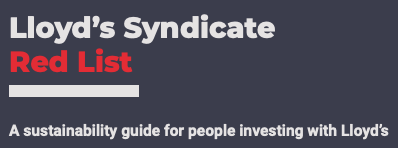Paris, 20 March 2025 – Individual investors with Lloyd’s of London are not being told the full story when it comes to the long-term costs of Lloyd’s business, according to a new “red list” published by Reclaim Finance today [1], as Lloyd’s posts close to £10 billion in profits [2].
The Lloyd’s Syndicate Red List – a sustainability guide for people investing with Lloyd’s – assesses the fossil fuel underwriting policies of the 42 third-party syndicates at Lloyd’s which are open to individual investors, also known as the ‘Names’.
It finds that all but one of these syndicates is willing to provide insurance for the development of new oil and gas fields, locking in future fossil fuel emissions with destabilizing consequences for the climate. And all of the third-party syndicates appear willing to cover the expansion of LNG export terminals, even though greenhouse gas emissions for LNG can be higher than for coal [3].
Thirty three of the 42 third-party syndicates would also still consider providing insurance for new coal projects. Argenta Syndicate n°2121 is the only syndicate that pledges not to provide insurance for the construction of new coal projects or new oil and gas fields.
According to the International Energy Agency, there is no room for new coal projects or new oil and gas fields or new LNG export terminals if the world is to limit global temperature rise to 1.5 degrees [4].
“Lloyd’s Names trust Members’ Agents and Lloyd’s to give them the full picture when it comes to the long-term risks of their investments. But in reality, their investments are being used to jeopardize that future by supporting the expansion plans of the fossil fuel industry, whether coal, oil or gas. Almost all of the third-party syndicates are gambling on fossil fuel expansion and threatening our chances of stabilizing our climate,” says Reclaim Finance insurance campaigner, Ariel Le Bourdonnec.
According to the Institute and Faculty of Actuaries, our global economy could lose up to 50% of its GDP in the coming decades due to natural disasters exacerbated by an increasingly hot planet [5].
Extreme weather and events like the Los Angeles fires have pushed up insurance and reinsurance costs in recent years, with policy-holders facing a steady rise in the price of their home and car insurance policies in the UK and elsewhere [6]. Yet insurers have seen increased premiums boost their profits. The Lloyd’s market reported an increase in underwriting results to £5.9 billion in 2023 [7].
For the first time, private investors can now find reliable information about the sustainability of their third-party syndicates’ underwriting activities in the Red List.
Ariel continues, “Investors wishing to invest their wealth without fueling the climate crisis can now ask their Members’ Agent to reduce or even eliminate their exposure to syndicates still supporting the fossil fuel industry’s expansion plans.”
Contacts:
- Ariel Le Bourdonnec, insurance campaigner, Reclaim Finance, ariel@reclaimfinance.org
- Helen Burley, international media, Reclaim Finance, helen@reclaimfinance.org, +44 7703 731923
Notes:
- The Lloyd’s Syndicate Red List – a sustainability guide for people investing with Lloyd’s, Reclaim Finance, March 2025
- See: Lloyd’s preliminary results 2024
- See: The greenhouse gas footprint of liquefied natural gas (LNG) exported from the United States
- In its most recent Net Zero Emissions Scenario by 2050, the IEA says no new oil and gas fields or new LNG export terminals are needed. See IEA, World Energy Outlook 2024, October 2024
- See Institute and Faculty of Actuaries, Planet Solvency – finding our balance with nature, 2025
- Financial Times, Home insurance premiums to keep rising in ‘difficult year’, 2024
- See Lloyd’s of London, Investor Roadshow 2024, 2024
